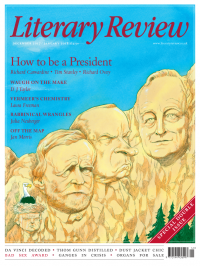Robert Gerwarth
Endgame
1917: War, Peace, and Revolution
By David Stevenson
Oxford University Press 480pp £30
On 11 November 1917, one year before the First World War’s formal end, Erich Ludendorff, Germany’s most important military strategist, looked optimistically into the future. Russia had effectively been knocked out of the war, allowing Berlin to move several divisions to the Western Front, where the German High Command sought to secure a decisive victory over Britain and France before the United States – at war with Germany since April that year – could land large numbers of soldiers in France. Italy, meanwhile, had suffered a severe blow at the Battle of Caporetto, where Austro-Hungarian forces, supported by German units, devastated the Italian defenders. ‘The situation in Russia and Italy will likely make it possible to strike a blow in the western theatre of war in the new year. The balance of forces will be approximately equal. Around thirty-five divisions and one thousand heavy artillery pieces can be made available for an offensive ... Our overall situation demands that we strike as early as possible, ideally in late February or early March, before the Americans throw powerful forces into the balance.’
The year 1917 was one of high expectations and fateful decisions that changed the nature of the Great War and determined its outcome. It is the subject of David Stevenson’s new book. For Stevenson, one of Britain’s most eminent historians of the Great War (this is his eighth

Sign Up to our newsletter
Receive free articles, highlights from the archive, news, details of prizes, and much more.@Lit_Review
Follow Literary Review on Twitter
Twitter Feed
It wasn’t until 1825 that Pepys’s diary became available for the first time. How it was eventually decrypted and published is a story of subterfuge and duplicity.
Kate Loveman tells the tale.
Kate Loveman - Publishing Pepys
Kate Loveman: Publishing Pepys
literaryreview.co.uk
Arthur Christopher Benson was a pillar of the Edwardian establishment. He was supremely well connected. As his newly published diaries reveal, he was also riotously indiscreet.
Piers Brendon compares Benson’s journals to others from the 20th century.
Piers Brendon - Land of Dopes & Tories
Piers Brendon: Land of Dopes & Tories - The Benson Diaries: Selections from the Diary of Arthur Christopher Benson by Eamon Duffy & Ronald Hyam (edd)
literaryreview.co.uk
Of the siblings Gwen and Augustus John, it is Augustus who has commanded most attention from collectors and connoisseurs.
Was he really the finer artist, asks Tanya Harrod, or is it time Gwen emerged from her brother’s shadow?
Tanya Harrod - Cut from the Same Canvas
Tanya Harrod: Cut from the Same Canvas - Artists, Siblings, Visionaries: The Lives and Loves of Gwen and Augustus John by Judith Mackrell
literaryreview.co.uk